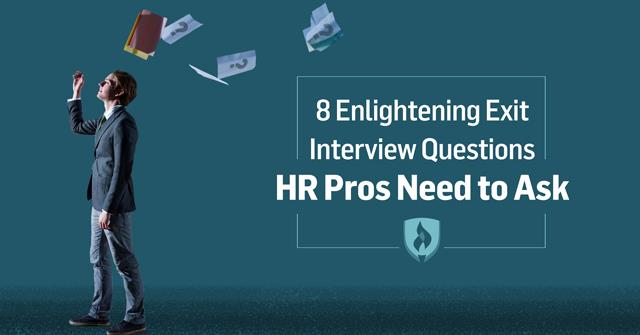
It’s inevitable: employees leave their jobs for other opportunities. There’s a lot of bad that comes when an employee parts ways with their company, especially for the human resources professionals who are tasked with filling the gap. Extra work or delays for employees who stay, lost expertise and finding a suitable replacement can all be a challenge. But it doesn’t have to be all bad.
Enter the exit interview. This sometimes awkward process might be undervalued in some institutions, but there’s a lot of value to be found in this silver lining. By asking the right exit interview questions, human resources professionals can glean constructive feedback for improving their organization.
But which questions should you ask and why? We compiled the most valuable exit interview questions to help HR pros take advantage of an otherwise negative situation. Read on for invaluable insight straight from human resources experts who know their way around an exit interview.
8 exit interview questions HR pros should always ask
1. “What led you to decide to leave the company?”
Any insight you can gain about why an employee is leaving can help you change your company for the better and decrease your turnover rates, according to HR consultant Ron Thomas. He says this question is best asked after you’ve gone through the formalities and have built up a comfort level between you and the interviewee.
Once that rapport is built, this can be an illuminating question that identifies the employee’s “breaking point” and other important issues worth investigating further. “Every time, upon reflection, the employee would tear up and give me the real story,” Thomas says.
2. “How has your job description changed since you were hired?”
Job duties can evolve over time. As an HR professional, you need accurate, up-to-date information about the available position so you can appropriately replace the employee who’s leaving.
The reasoning for asking this might feel a bit cold, but this will ensure that the job posting for backfilling this position is current. This can help minimize the amount of training needed before they’re up to speed.
3. “If you could change something about the company that would make you stay, what would it be and why?”
This question can yield a treasure trove of information. Whether the employee is frustrated with a manager, work processes or their compensation, the answer they provide can both identify the problem and potentially offer a viable solution. It may be too late to keep this employee on board, but odds are good that other employees have similar thoughts.
4. “What does your new job offer that this position lacks?”
Do your company’s benefits and compensation stack up well against the competition? Are their hours more flexible? The answer to this question can provide insight into ways your company could improve its standing among similar companies in the area.
If you notice you have multiple employees leaving because of a lacking health insurance plan, it may be time for your company’s leadership to reevaluate. On the other hand, if an employee is leaving to reduce their commute, you can breathe a sigh of relief knowing their decision to leave was personal, not based on your company’s shortcomings.
5. “Do you feel you were given the tools, training and resources needed to succeed at your position? Please explain.”
Questions like this allow exiting employees to indirectly offer feedback on their managers without fearing reprisal for “attacking” them, according to Ronald Schmedly, president of DefensiveDriving.org. It’s also wise to avoid having the direct manager of the exiting employee present at the exit interview. Many people will soften their response of poor managers to avoid conflict, robbing the company of honest critiques and better feedback.
6. “Would you recommend this company to a friend?”
You can collect a lot of information about potential issues in an exit interview. But it can be tricky to tell if these issues were huge, deal-breaking problems or just minor annoyances that added up over time.
The employee’s response here will give you a good feel for the severity of their workplace grievances. A hard “No” indicates something is majorly amiss within the company. Conversely, a “Yes, but …” indicates the issue might be a little less pressing.
7. “What was the best part of your job here?”
A break from hearing about what your organization does wrong is always nice, right? Knowing what your company does well is just as important as recognizing its weak spots.
Brandi Britton, district president of Office Team, says this question provides validation on what you’re doing right and allows you to reinforce the positive aspects of the job. You can then use this information to highlight the perks of the job and attract better prospects when filling the open position.
8. “Do you have any suggestions for improving employee morale?”
This question can help with organizational blind spots. Are employees quietly stewing about a policy and not speaking up for fear of reprisal? You may find out here. Even if the employee doesn’t reveal specific issues, the suggestions they provide could prove to be great ideas they never had a chance to bring up.
Human resources makes a difference
The answers to these exit interview questions can produce a wealth of insight into the state of your organization. Make a difference as a human resources professional by using the information you’ve gathered as a reference point for your organization’s leadership as they consider initiatives or policy changes. You might not be able to prevent all employee turnover, but don’t underestimate the value of a well-constructed exit interview and its ability to lead to positive change.
RELATED ARTICLES:




